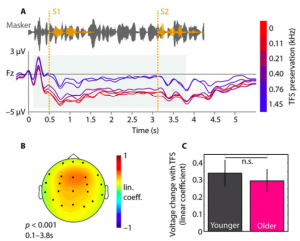Congratulation to PhD student Malte Wöstmann, who – with Erich Schröger and Jonas Obleser – has a new article in press at the Journal of Cognitive Neuroscience
Acoustic detail guides attention allocation in a selective listening task
forthcoming. We will update you accordingly as the paper comes online. We will share however one of Malte’s figures here as a teaser: The paper utilises a very classic component of the evoked potential, the contingent negative variation (the CNV; or a close relative thereof, see the actual paper for discussion) to study how older and younger listeners allocate their attentional resources depending on implicit cues on to-be-expected listening difficulties.
References
- Wöstmann M1, Schröger E, Obleser J. Acoustic Detail Guides Attention Allocation in a Selective Listening Task. J Cogn Neurosci. 2014 Nov 12:1–13. PMID: 25390200. [Open with Read]

